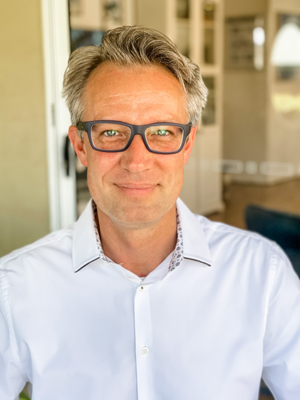| Research • Education • Advocacy • Sustainability |
|
| Listening – Research |
| Understanding – Videos |
| Education – Publications |
| Teaching – Presentations |
| Zero Emissions – Futurity |
 |
|
| Creating a fair future for all. | Photo © Randy Plett |
WelcomeThis is the personal website of Johannes Michael Luetz. Here you can find information about my personal and professional background and interests, including projects I have been involved with over the years. I chose the above photo of the beautiful African student because for me it symbolises the strategic importance of education to advance human development and the planetary common good. Welcome! 
Dr. Johannes M. Luetz (BA/USA, MBA/Germany, Ph.D./Australia) is the Research Chair at Christian Heritage College (CHC), an independent higher education provider in Brisbane, Australia. He has consulted extensively for World Vision International on research projects raising awareness of the growing effects of demographic, environmental and climate change on vulnerable communities in Asia, Africa and Latin America. He was raised in Sierra Leone and Switzerland, cares deeply about poverty reduction, holistic education, justice and equity, and has researched and published conceptually and empirically in these areas. He is a big picture thinker and has interdisciplinary research interests at the science-faith and science-policy interface. This interest has resulted in several authored and edited books, including Beyond Belief—Opportunities for Faith-Engaged Approaches to Climate-Change Adaptation in the Pacific Islands (Springer, 2021), Innovating Christian Education Research—Multidisciplinary Perspectives (Springer, 2021), Handbook on Climate Change Management—Research, Leadership, Transformation (Springer, 2021), Reimagining Christian Education—Cultivating Transformative Approaches (Springer, 2018), and Planet Prepare (WVI, 2008), among others. Dr. Luetz is an Adjunct Academic in the School of Social Sciences at the University of New South Wales (UNSW) in Sydney. There he also completed his Ph.D. (Environmental Policy and Management) into human climate migration. His Ph.D. research has featured in national news and documentaries [Bolivia; Bangladesh; Maldives]. He has spoken at the UNSW Town & Gown annual signature dinner and has been a guest on ABC Radio National The Science Show. His research has attracted grants, prizes, scholarships, awards and distinctions, including best thesis prize (2006), UNSW UIP Award (2009), UNSW ASPIRE Award (2012) and best paper awards (2017, 2018). Dr. Luetz convenes the Master of Social Science Leadership program at CHC, which through its research and teaching activities on change leadership seeks to give rise to equitable social transformation. Dr. Luetz is also Adjunct Fellow at the University of the Sunshine Coast (USC), Deputy Editor at Emerald journal IJCCSM, Member of the Academic Board at CHC, and Member of the Editorial Board at Springer Nature journal Discover Sustainability. [Google Scholar; ORCID iD; ResearchGate; LinkedIn]
Welcome! By promoting research, education, advocacy, sustainability and poverty reduction, contents on this website aim to advance human development and the planetary common good. Five webpages feature relevant research, videos, publications, presentations, and a "zero-emission society" essay. Let's work together to create a friendly, equitable and livable future for all. All over the world climate change is manifesting as the defining human development challenge of the 21st Century. Failure to rise up and tackle that challenge will progressively slow, stall and reverse progress made on global poverty reduction over many decades. In a warming world the poorest are increasingly suffering the earliest and/or severest setbacks, even though they have contributed least to the problem. Poverty is the overwhelming reason why people are vulnerable. Being poor means being forced to live in inhospitable and marginalised locations where recurrent droughts, floods and storms relentlessly erode opportunities and reinforce inequalities. Meanwhile the scientific evidence indicates that the world is inching ever closer to a point at which irreversible ecological collapse may become unavoidable. Unless there is an immediate transition towards a decarbonised global society with near-zero emissions of CO2 and other long-lived greenhouse gases, future development setbacks will likely register on a scale not hereunto witnessed by humanity. But the future doesn't just happen. The future is made. There is no more inspiring motivator for societal reform than an attractive and achievable vision, widely shared. While the past is sealed, the future is still up for grabs. We should care about creating a livable future — we will spend the rest of our lives there. Scientists have said for many years that action on climate change is urgent. Humanity must urgently change course. Let's be daring instead of defensive, hopeful instead of despondent, devoted instead of divided. As Nelson Mandela has said in Lessons of Leadership: "Courage is not the absence of fear — it is inspiring others to move beyond it." In a world characterised by inequalities and disparities it is easy to forget that we are all members of the same human family, collectively sharing the same Planet — our common home — with the future as our joint destiny. Let's work together to ensure that climate change does not flick human development into reverse gear. By promoting research, education, advocacy, sustainability and poverty reduction, contents on this webpage aim to make a contribution. |
|
| Except for photos, logos and where noted, works on this webpage are licensed under a Creative Commons License |
|